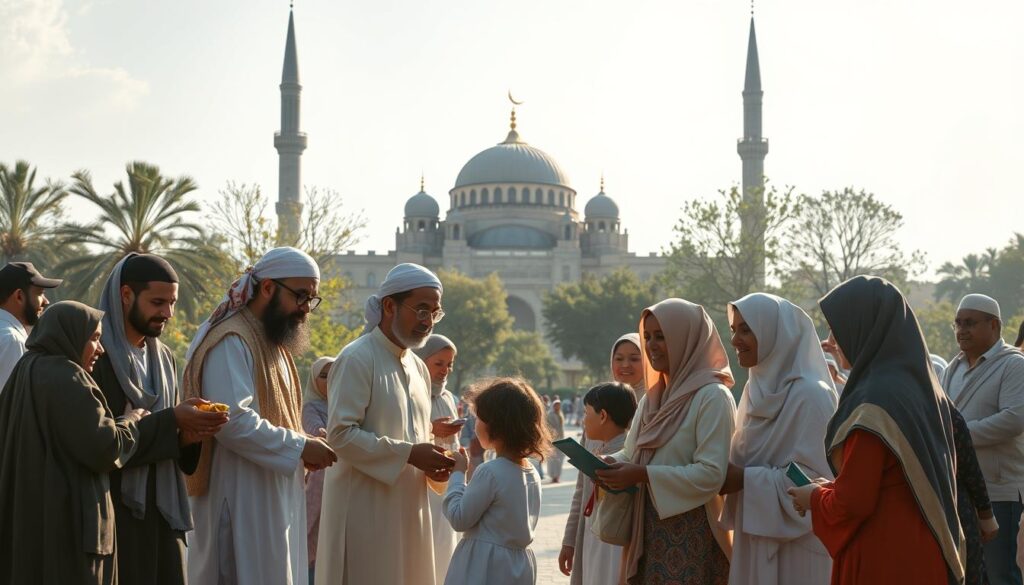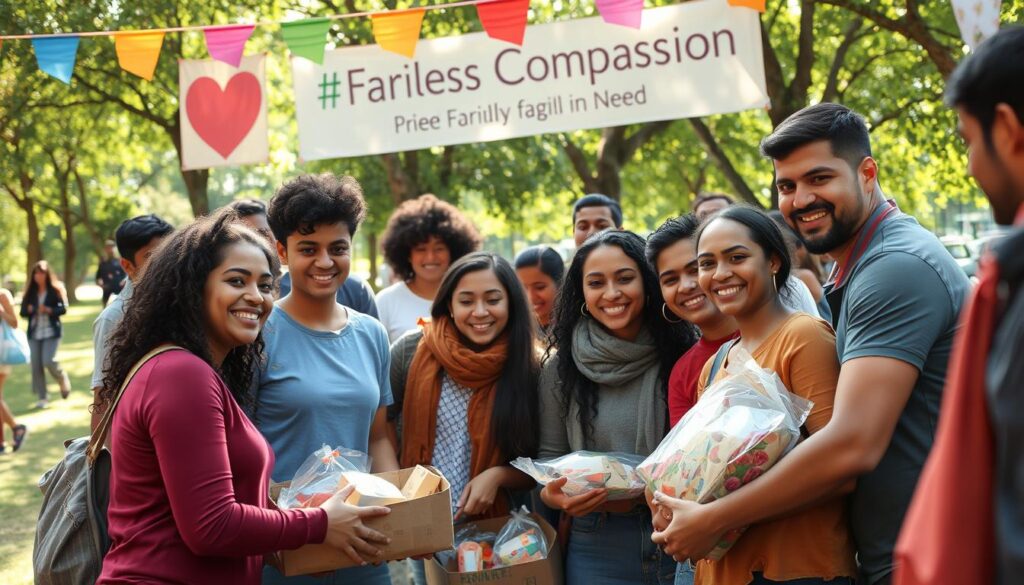Did you know Zakat, a key charity in Islam, asks Muslims to give 2.5% of their wealth to those in need? This act of giving is at the heart of Islam. When Zakat and Sadaqah, a voluntary charity, work together, they can change lives. At Umar Khan Charity Organization, we see charity as key to a fair and caring world. To learn more about Zakat on investments, visit our website at Zakat on investments and see how you can help.
Key Takeaways
- Charity is a vital aspect of Islam, with Zakat and Sadaqah being two important forms of giving.
- Zakat is a mandatory form of charity, requiring Muslims to give 2.5% of their wealth and assets to those in need.
- Sadaqah is a voluntary form of charity that can take many forms, including monetary donations, food, and clothing.
- Charity in Islam serves as a means to bring justice, balance, and kindness to society.
- Acts of charity in Islam hold rewards in both this life and the hereafter, including inner satisfaction and positive reputation.
- Understanding the role of charity in Islam is key for a fair and caring society.
- By donating to organizations like Umar Khan Charity, individuals can positively impact others’ lives. This shows the Islamic view on charity and its role in Islam.
Understanding Charity in Islam
We see charity as a key part of Islam. It helps both individuals and society. The Quran and Hadith talk about the importance of Sadaqah, or voluntary charity. They say it cleanses our wealth and soul.
These teachings also talk about the good of giving in Islam. They urge Muslims to give freely and without expecting anything in return.
The Quran and Hadith guide us on different types of charity. This includes Zakat, Sadaqah, and more. We can give in many ways, like:
- Donating money or goods to those in need
- Volunteering our time and skills to help others
- Spreading kindness and compassion in our daily lives
Charity brings many benefits, like a clean soul and more wealth. The Prophet Muhammad (peace be upon him) said, “Charity does not decrease wealth, and forgiveness and humility elevate one’s status.” We aim to make charity a regular part of our lives. We also encourage others to do the same, as it strengthens our community and sense of responsibility.
The Concept of Zakat
Understanding Zakat is key for Muslim donors and volunteers. Zakat is a mandatory charity in Islam. It’s based on an individual’s wealth and assets.
Islamic guidelines stress the need to help the poor, needy, and oppressed. Giving Zakat and Sadaqah brings many rewards. We encourage Muslims to give both, showing a strong commitment to charity.
Here are some key points to consider when calculating and distributing Zakat:
- Zakat is typically paid out at the end of the year after calculating any remaining wealth.
- The nisab threshold for Zakat is set at the value of 87.48 grams of gold or 612.36 grams of silver.
- Individuals who do not meet the nisab threshold are not obligated to pay Zakat.
The Quran lists eight groups eligible for Zakat. This shows its targeted nature. We aim to help Muslim donors and volunteers understand Zakat. This way, they can make a difference in their communities.
The Concept of Sadaqah
Understanding Sadaqah is key to seeing its value in Islam. Sadaqah is giving charity freely, anytime, and in any amount. It’s a big part of giving in Islam. The Quran says, “Whatever you donate will be paid back to you in full, and you will not be wronged”.
Sadaqah helps fight poverty, hunger, and strengthens community ties. We can give in many ways, like money, food, clothes, or help. The Prophet Muhammad (PBUH) said Sadaqah can wipe out sins like water puts out fire. This shows how important giving is in Islam.
Some important things about Sadaqah are:
- Giving regularly, with sincerity, and within one’s means
- Giving in secret, as this has a higher spiritual reward
- Volunteering time or donating resources, in addition to monetary donations
- No minimum amount is required, and individuals are encouraged to give what they can afford
By practicing Sadaqah, we build a sense of community and shared duty. It also brings us spiritual rewards. As we aim to make a difference, we see Sadaqah’s role in Islam’s values of giving.
Historical Perspective of Charity in Islam
We explore the history of charity in Islam, focusing on its role in early Islamic society. The Quran and Hadith guide us on charity’s importance. They show how it helps with social welfare and economic growth.
The Islamic perspective on charity comes from the Quran. It teaches the value of giving to those in need. The Quran tells us who deserves our help, like the poor and those who can’t help themselves.
Charity from the Time of Prophet Muhammad
The Prophet Muhammad showed us how to give. He taught us to give based on what we can afford. He also taught us to balance giving with our own needs.
Early Muslims set up ways to collect and give out charity. They chose special people to help distribute the charity to those who need it most.

The Role of Charity in Early Islamic Society
The Prophet Muhammad’s example taught the community about charity. He showed that every good deed counts, not just money. They also started endowments (awqaf) to keep giving to the community.
Learning about the Role of Charity in Islam helps us see its value. It encourages us to create a more caring and fair world.
Modern Applications of Zakat and Sadaqah
Zakat and Sadaqah are key in Islam, showing us how to help others. Islamic guidelines on charitable giving help us give back to society. By donating to good causes, we can change lives for the better.
Charity groups are important in sharing Zakat and Sadaqah. They help those in need. For example:
- MACA raised almost $100,000 through online fundraising.
- The Eyes of Light raised over €6,000 during Ramadan.
These efforts show how Zakat and Sadaqah help people and communities. By following Islamic guidelines on charitable giving, we help make a difference.
Exploring Zakat and Sadaqah today reminds us of their rewards. Giving generously helps build a fair and caring world.
Umar Khan Charity Organization: Making a Difference
We aim to change lives through faith-based humanitarian work. We stick to Islamic principles. Our mission is to highlight the value of charity and helping those in need.
From an Islamic perspective on charity, we see giving as key to our faith. The Role of Charity in Islam is to help society, improve the economy, and support education. Our programs aim to positively affect others, showing the Virtues of giving in Islam.
There are many ways to get involved with us:
- Monthly Giving: Become a monthly donor and support our ongoing efforts.
- Financial donations: Your donations help us continue our work.
- Corporate giving and partnerships: Companies can also make a big difference.
Every donation, no matter the size, helps us change lives. We invite you to join us in making a difference and supporting the Role of Charity in Islam.
| Program | Description |
|---|---|
| Feeding hungry families | Providing food and nutrition to those in need. |
| Education | Supporting educational initiatives and promoting literacy. |
| Clean water | Providing access to clean water and sanitation facilities. |
The Impact of Charity on Lives
Charity changes lives, bringing people together and helping communities grow. It’s a key part of our faith, showing us the value of Quranic teachings on charity. It helps us understand how to help others and improve our world.
Empowering Vulnerable Communities
Charity gives power to those who need it most. It provides them with the tools to better their lives. The Quran teaches us the Importance of Sadaqah, showing us how to show kindness and care.
Success Stories from Beneficiaries
Many people have been helped by charity. For example, the Ramadan Jars Project by I Can Malaysia helped over a hundred families. These stories show how charity changes lives and brings rewards in Islam.
In summary, charity deeply affects our lives and communities. It’s vital to grasp the Quranic teachings on charity and the Importance of Sadaqah. By giving, we help others, grow our communities, and earn rewards in Islam.
Ways to Get Involved
We think everyone can help the community in some way. There are many ways to help, like volunteering, donating, or supporting our cause. The Role of Charity in Islam is not just about money. It’s also about giving time and skills to those who need it.
Every small act of kindness can change lives, as the Islamic perspective on charity teaches us. We can all help by volunteering, donating, or sharing the value of charity. Here are some ways to get involved:
- Volunteering at local charities or community events
- Donating to reputable organizations that support causes we care about
- Spreading awareness about the importance of charity and the impact it can have on individuals and communities
At Umar Khan Charity Organization, we offer chances to volunteer and donate. We believe together, we can change lives and build a more caring and fair world.

The Role of Digital Platforms in Charity
Digital platforms have greatly changed how we give to charity, including Zakat in Islam. They make it simpler and more accessible for people to help out. This is a big deal for charitable giving.
Online donations and fundraising have opened up new ways to reach more people. This has helped increase the Rewards of charity in Islam. More folks can now join in and feel the joy of giving.
- Increased accessibility and convenience for donors
- Improved transparency and accountability for charitable organizations
- Enhanced engagement and community building through social media
Using digital platforms, we can make our charity work more powerful. We must keep following Islamic values as we use these tools. This ensures our charity efforts are true to Zakat in Islam and Islamic guidelines.
Challenges Facing Charity Work in Islam
Charity work in Islam has many challenges. These include wrong ideas about Zakat and Sadaqah. Also, there are social and economic barriers to overcome.
Misconceptions About Zakat and Sadaqah
Many people don’t understand Zakat and Sadaqah. This is because of wrong beliefs. The Quran says charity is key in Islam. It teaches us to give to those who need it.
Navigating Social and Economic Barriers
Charity groups must find new ways to help. They need to follow Quranic teachings and know what the community needs. Here are some ways to help:
- Providing food and clean water to the poor
- Donating clothing to those in need
- Offering medical assistance to those who cannot afford healthcare
By facing these challenges together, we can build a kinder community. We can make sure the Importance of Sadaqah is in our lives.
Future of Charity in Islam
The future of charity in Islam looks bright. We see new ways and a strong will to make a lasting difference. The Quran and Hadith guide us, inspiring us to use new tech and creative ideas. This helps us do more good for those in need.
Harnessing Digital Platforms for Greater Reach
Online platforms connect donors with those who need help, no matter where they are. This lets the Muslim world come together to help others. Tools like crowdfunding, mobile payments, and social media are changing how we give.
Fostering Collaborative Partnerships
Muslim charities are working together with governments, non-profits, and companies. They share goals and resources to solve big problems. This teamwork shows the Islamic values of unity and helping each other.
We’re excited for the future of charity in Islam. We’ll keep up the values of Zakat and Sadaqah. With innovation, teamwork, and a focus on lasting change, we’re sure to make a bigger difference. This will help more people and strengthen our global community.






